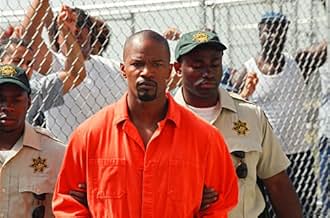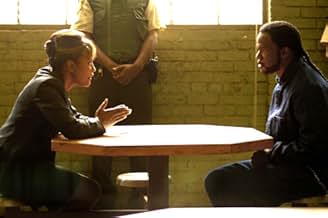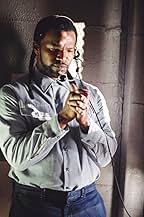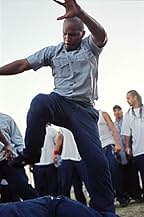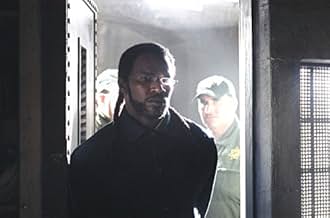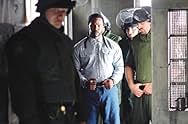IMDb रेटिंग
6.3/10
3.3 हज़ार
आपकी रेटिंग
अपनी भाषा में प्लॉट जोड़ेंThe story of Stan "Tookie" Williams, the former leader of the "Crips" gang. Stan wrote award-winning children's books, brokered peace treaties between warring gangs, and won a Nobel Peace Pr... सभी पढ़ेंThe story of Stan "Tookie" Williams, the former leader of the "Crips" gang. Stan wrote award-winning children's books, brokered peace treaties between warring gangs, and won a Nobel Peace Prize nomination before he was executed.The story of Stan "Tookie" Williams, the former leader of the "Crips" gang. Stan wrote award-winning children's books, brokered peace treaties between warring gangs, and won a Nobel Peace Prize nomination before he was executed.
- पुरस्कार
- 12 जीत और कुल 8 नामांकन
Brenden Jefferson
- Young Stan Williams
- (as Brenden Richard Jefferson)
Wes Williams
- Tony Bogard
- (as Wes 'Maestro' Williams)
फ़ीचर्ड समीक्षाएं
7kerm
While packing up my apartment to move, Redemption just happened to come on the TV. I had heard about the controversy surrounding the movie, how it was supposed to "glamorize" gang behavior and justify it. Needless to say (or else I wouldn't be writing this), I got hooked on the film, and didn't get much packing done.
Tookie Williams co-founded the Crips in LA, but after his arrest and death sentence for the murders of several people, Williams embarked on a different path. While on death row, he has written a children's series of books aimed at preventing gang violence. For his efforts, he has been nominated multiple times for the Nobel Peace Prize, and is credited with a truce between the Crips and the Bloods in Newark, NJ.
The film, which chronicles Williams' life, shows how he grew up and got involved with gangs. However, the main thrust of the film is clearly that violence is not right, and that Williams, knowing what he knows now, is seeking to undo as much of his own actions as he can.
Williams does not discount the glamorous lifestyle that gangs allowed him, but recognizes now the pain and destruction that they cause. Williams himself understands the seductive nature of the gang, and is striving to help young people understand the consequences of their actions, before they do them.
Jamie Foxx, up to this point an underrated actor, displays amazing range in his portrayal of Williams. We are meant to see Williams, not as a great man, but rather as a flawed human being, one who has made mistakes and now is fighting to atone for them. If we cannot learn from our mistakes, we are no better than those we criticize. Foxx's performance, for which he has received many accolades, is incredible to watch.
If you are still reading this, you have enough of an open mind to appreciate this film. Please don't let the negative criticism dissuade you from watching this film. The film does not shirk from attempting to show the seductive side of gangs, but it also leaves no question about which side Williams is on. Williams' cause to eliminate gang warfare is a righteous one, and if he succeeds, we all win.
Tookie Williams co-founded the Crips in LA, but after his arrest and death sentence for the murders of several people, Williams embarked on a different path. While on death row, he has written a children's series of books aimed at preventing gang violence. For his efforts, he has been nominated multiple times for the Nobel Peace Prize, and is credited with a truce between the Crips and the Bloods in Newark, NJ.
The film, which chronicles Williams' life, shows how he grew up and got involved with gangs. However, the main thrust of the film is clearly that violence is not right, and that Williams, knowing what he knows now, is seeking to undo as much of his own actions as he can.
Williams does not discount the glamorous lifestyle that gangs allowed him, but recognizes now the pain and destruction that they cause. Williams himself understands the seductive nature of the gang, and is striving to help young people understand the consequences of their actions, before they do them.
Jamie Foxx, up to this point an underrated actor, displays amazing range in his portrayal of Williams. We are meant to see Williams, not as a great man, but rather as a flawed human being, one who has made mistakes and now is fighting to atone for them. If we cannot learn from our mistakes, we are no better than those we criticize. Foxx's performance, for which he has received many accolades, is incredible to watch.
If you are still reading this, you have enough of an open mind to appreciate this film. Please don't let the negative criticism dissuade you from watching this film. The film does not shirk from attempting to show the seductive side of gangs, but it also leaves no question about which side Williams is on. Williams' cause to eliminate gang warfare is a righteous one, and if he succeeds, we all win.
The Beginning In the spring of 1971, when Tookie was 17, he was in a very different situation. He was a high school student from South Central Los Angeles. He had a fearsome reputation as a fighter and as a "general" of South Central's west side. And, around that time, Tookie, along with Raymond Lee Washington, created what would one day be a super-gang, the Crips. Back in the day when Tookie and Raymond founded the Crips, many of the young people of South Central Los Angeles were involved with small gangs. Those gang members roamed South Central taking property from anyone who feared them, including women and children. To protect the community, Tookie and Raymond organized the Crips.
Growth By 1979, the Crips had grown from a small Los Angeles gang to an organization with membership spread across the State of California. By this time, Crips had also become just like the gang members they had once sought to protect themselves from -- Crips had become gangbangers who terrorized their own neighborhoods.
Soon the Crips lost both their leaders: in 1979, Raymond was murdered by a rival gang member, and, that same year, Tookie was arrested. He was charged with murdering four people. In 1981, Tookie was convicted of those crimes and placed on death row.
Life in Prison In 1987, Tookie began what became a 6 1/2-year stay in solitary confinement. After two years there, Tookie began to look at himself. He focused on the choices he had made in his life and then committed himself to make a drastic change. The long, difficult process he undertook to rebuild his character put him in touch with his true spirit, his own humanity. Only then could Tookie finally begin to care about the many children, mothers, fathers and other family members of this country hurt by the Crips legacy and by its explosive growth. The gang is now in 42 states and on at least one other continent: South Africa. Youngsters in Soweto and other South African cities have formed the Crips copycat gangs
Tookie Today Tookie greatly regrets the violent history of the Crips -- particularly how so many young black men have hurt each other -- and he wants to do what he can to stop it. The Tookie Speaks Out Against Gang Violence book series for elementary-school-age children is the first fruit of his longing to prevent young people of every color from becoming gangbangers, from ending up in prison, crippled by bullets, or killed.
Tookie is determined to make amends for having been a co-founder of the Crips. He intends to try in every way he can to guide those youngsters who have imitated him away from the road that led him to death row where he faces State execution. "Don't join a gang," he tells children in his books, writing from his San Quentin cell. "You won't find what you're looking for. All you will find is trouble, pain and sadness. I know. I did."
Growth By 1979, the Crips had grown from a small Los Angeles gang to an organization with membership spread across the State of California. By this time, Crips had also become just like the gang members they had once sought to protect themselves from -- Crips had become gangbangers who terrorized their own neighborhoods.
Soon the Crips lost both their leaders: in 1979, Raymond was murdered by a rival gang member, and, that same year, Tookie was arrested. He was charged with murdering four people. In 1981, Tookie was convicted of those crimes and placed on death row.
Life in Prison In 1987, Tookie began what became a 6 1/2-year stay in solitary confinement. After two years there, Tookie began to look at himself. He focused on the choices he had made in his life and then committed himself to make a drastic change. The long, difficult process he undertook to rebuild his character put him in touch with his true spirit, his own humanity. Only then could Tookie finally begin to care about the many children, mothers, fathers and other family members of this country hurt by the Crips legacy and by its explosive growth. The gang is now in 42 states and on at least one other continent: South Africa. Youngsters in Soweto and other South African cities have formed the Crips copycat gangs
Tookie Today Tookie greatly regrets the violent history of the Crips -- particularly how so many young black men have hurt each other -- and he wants to do what he can to stop it. The Tookie Speaks Out Against Gang Violence book series for elementary-school-age children is the first fruit of his longing to prevent young people of every color from becoming gangbangers, from ending up in prison, crippled by bullets, or killed.
Tookie is determined to make amends for having been a co-founder of the Crips. He intends to try in every way he can to guide those youngsters who have imitated him away from the road that led him to death row where he faces State execution. "Don't join a gang," he tells children in his books, writing from his San Quentin cell. "You won't find what you're looking for. All you will find is trouble, pain and sadness. I know. I did."
This movie was brilliantly directed and very moving. Before watching this movie, I never knew the true story behind the creation of the gangs in California. My outlook on gangs was vague but very harsh. This film opened me up to a whole new world of insight on gangs and the man himself Stan "Tookie" Williams. This film showed me that with a positive influence anything is possible. This film should be watched by not only want to be gang members but children of all creeds and nationality. My kids watched this movie and were very moved by what they saw also. This movie gets two thumbs up for a well directed, well acted, well portrayed story of Mr. Williams. If i were offered the opportunity to meet him it would be an honor for not only myself, but my kids as well.
The topic of Stan Williams often incites heated and emotional debate. A movie about his life was therefore a perfect opportunity to inform both sides of the armchair debaters, showing why Tookie was put in prison and sketching the events leading to his self-claimed redemption. Tookie was a wretched man - he said so himself. The movie should have shown how wretched he was. It should have shown the violence he was exposed to when he was young, the murders he was convicted for, his violent behaviour in prison for many years before he had a change of heart. He also always claimed he was innocent of the crimes he was sentenced for, so there was an opportunity to film the murders with some doubt as to the perpetrator. It could really have built around the doubt, and played on the emotional conflict of carrying out the sentence or having mercy on a changed man. But the movie doesn't focus on the character change of Tookie. It never focuses on his violent nature, and the viewer is not taken on the journey of the evolving character. Instead, the film starts off with the nice Tookie Williams who has kind eyes and a nature that evokes sympathy. His former crimes are only eluded to, and he is depicted as an honest man seeking release from prison as a place he can't get used to and just doesn't belong. Jamie Foxx is a brilliant actor, but unfortunately does not portray the latent demon that was Tookie. Jamie is too nice-looking, and not nearly huge enough. If you are not familiar with the Tookie Williams story, this movie will seem to jump around a lot and will not make as much sense as it is supposed to. Those unfamiliar with the story will side immediately with Tookie and want him to be released from prison. As such, it is not an accurate portrayal, and it is not clear what the film was trying to create. The movie never really finds its rhythm and it is an unfortunate lost opportunity. The viewer should have a good idea of how bad Tookie was, and then be able to judge for himself the genuineness of the change, and only then start to question what Tookie's fate should have been. These questions did not need to be answered in the movie, but they should at least have been posed. Instead, the end result is a random and inelegant sympathetic sketch of Tookie's last days that ends on an imperfect cadence.
STAR RATING: ***** The Works **** Just Misses the Mark *** That Little Bit In Between ** Lagging Behind * The Pits
A true story depicting the story of Crips founder Stanley 'Tookie' Williams, played by Jamie Foxx. Imprisoned on multiple counts of murder in the early 80s, the film takes off on the verge of Tookie's execution date, when he is visited by a journalist (Lynn Whitfield) eager to learn about the gang culture. Impressed by the intelligent and seemingly remorseful man she now sees in front of her, she is astonished when he asks for her help-in writing children's books warning of the dangers of gang life! This is the beginning of his path to true redemption and his nomination for the Nobel Peace Prize.
I got a little caught up last year in the big Tookie debate as the day of his execution dawned (or maybe just a little after it.) Ancient history now, but I thought it would still be interesting to check this film out and learn a little bit more about the story behind Tookie.
As the actor playing him, Foxx was one of the celebrity vocal exponents for granting clemency to Tookie in the closing days before his execution. I'm willing to bet he met the man and spoke with him to research his part a bit, and that his portrayal of the imprisoned man is fairly accurate. Tookie's crimes sound truly despicable and in the eyes of many his death by lethal injection may even have sounded too merciful, but I think what the film is trying to portray is an example of how the American prison system has worked in it's ability to 'rehabilitate' a criminal and make him into a more intelligent, if not entirely decent, human being. With Foxx in the lead role, I can't help but feel his personal politics on the matter may have had some say in how the script panned out, and at times it does feel a little one-sided, going to great lengths to show the new improved Tookie without going into too much detail of the atrocious crimes he committed, but then a few other films could be accused of that recently.
Quality wise, the film suffers from a bit of a disjointed opening, with too much use of flashy camera effects. Early on, this actually put me in such low expectations for the rest of the film that I actually found myself nodding off for a bit. But Foxx does deliver a compelling performance in the lead role and things do get more interesting as the film goes on. Plus it should be commended for wrapping the very heavy subject matter it's depicting up in just under an hour and a half. ***
A true story depicting the story of Crips founder Stanley 'Tookie' Williams, played by Jamie Foxx. Imprisoned on multiple counts of murder in the early 80s, the film takes off on the verge of Tookie's execution date, when he is visited by a journalist (Lynn Whitfield) eager to learn about the gang culture. Impressed by the intelligent and seemingly remorseful man she now sees in front of her, she is astonished when he asks for her help-in writing children's books warning of the dangers of gang life! This is the beginning of his path to true redemption and his nomination for the Nobel Peace Prize.
I got a little caught up last year in the big Tookie debate as the day of his execution dawned (or maybe just a little after it.) Ancient history now, but I thought it would still be interesting to check this film out and learn a little bit more about the story behind Tookie.
As the actor playing him, Foxx was one of the celebrity vocal exponents for granting clemency to Tookie in the closing days before his execution. I'm willing to bet he met the man and spoke with him to research his part a bit, and that his portrayal of the imprisoned man is fairly accurate. Tookie's crimes sound truly despicable and in the eyes of many his death by lethal injection may even have sounded too merciful, but I think what the film is trying to portray is an example of how the American prison system has worked in it's ability to 'rehabilitate' a criminal and make him into a more intelligent, if not entirely decent, human being. With Foxx in the lead role, I can't help but feel his personal politics on the matter may have had some say in how the script panned out, and at times it does feel a little one-sided, going to great lengths to show the new improved Tookie without going into too much detail of the atrocious crimes he committed, but then a few other films could be accused of that recently.
Quality wise, the film suffers from a bit of a disjointed opening, with too much use of flashy camera effects. Early on, this actually put me in such low expectations for the rest of the film that I actually found myself nodding off for a bit. But Foxx does deliver a compelling performance in the lead role and things do get more interesting as the film goes on. Plus it should be commended for wrapping the very heavy subject matter it's depicting up in just under an hour and a half. ***
क्या आपको पता है
- ट्रिवियाJaime Foxx met the real Stanley "Tookie" Williams before the movie was released in TV.
- कनेक्शनFeatured in The 62nd Annual Golden Globe Awards 2005 (2005)
- साउंडट्रैकCome to Me
Performed by Heather
Written by George Howard & Fred Capitelli
टॉप पसंद
रेटिंग देने के लिए साइन-इन करें और वैयक्तिकृत सुझावों के लिए वॉचलिस्ट करें
विवरण
इस पेज में योगदान दें
किसी बदलाव का सुझाव दें या अनुपलब्ध कॉन्टेंट जोड़ें

टॉप गैप
By what name was Redemption: The Stan Tookie Williams Story (2004) officially released in India in English?
जवाब



